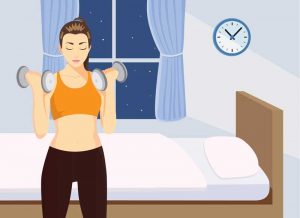Do you have trouble falling asleep? These secrets of sleep may be the key to a good night’s rest.
Falling and staying asleep can be an immense challenge for many people. In many cases, this is due to several myths about sleep. The following secrets of sleep are based on solid scientific evidence and, in many cases, run contrary to standard sleep advice.
1. Napping is good for you—in moderation.
Many people believe that a nap during the day will keep them from sleeping at night. However, this is not generally the case. While napping several hours can definitely interfere with sleep, a short nap can increase your alertness without having any effect on how you sleep at night. These little catnaps may even lower your risk of heart attack and other life-threatening diseases.
Humans are actually programmed to have a siesta in the early afternoon. Our temperatures dip and the hormones our bodies make to keep us awake fall to daytime lows. Eating a full lunch can exacerbate this. Feel free to enjoy 15-20 minutes of rest if you feel tired in the afternoon, but any longer will keep you from sleeping as well at night.
2. Exercise doesn’t always help you sleep.

In addition, most forms of exercise occur in well-lit spaces, which can prevent the release of melatonin and other sleep-inducing hormones. If you really are dedicated to that nighttime workout, consider doing yoga and other gentle workouts in a dim room. Stretching and relaxing will help you to get the rest you need.
3. Not everyone needs eight hours of sleep.
The amount of sleep people need varies from person to person, even more than researchers previously thought. Some people do best with very little sleep while others need closer to ten hours to feel alert. The American Academy of Sleep Medicine has officially decreed that seven hours is sufficient for most people, provided they feel well rested during the day.
How can you tell if you are getting enough sleep? If you feel rested and wake up without much trouble, then you are probably getting plenty. What is important is that you get the sleep you need to function well, not whether you meet some magical number.
4. Cold rooms create better, deeper sleep.

Your body cools itself in preparation for you to fall asleep. This cool-down occurs along with hormonal changes that help you to become sleepy and ultimately sleep well. Sleeping in a warm room prevents this cooling and keeps your body from following its standard bedtime routine. In addition, being too warm may make you uncomfortable and increase how often you wake up at night.
5. It’s normal and even healthy to wake up at night.
Many people believe that it isn’t good to wake up at night. However, circadian biology researchers and health professionals agree that this is actually quite normal. When you sleep, you cycle between deep and light sleep. It is normal to wake for a minute or less while in light sleep. In fact, many people wake up as often as ten times a night, each time for just a few seconds, and do not even remember this. As long as you fall back to sleep quickly, in less than five minutes, it is okay to wake up occasionally at night.
Understanding these secrets of sleep will help you to feel better rested and more alert during the day. In addition, these tips can help to prevent chronic disease and make you healthier over your lifespan. Getting good sleep is one of the foundations of good whole body health.







